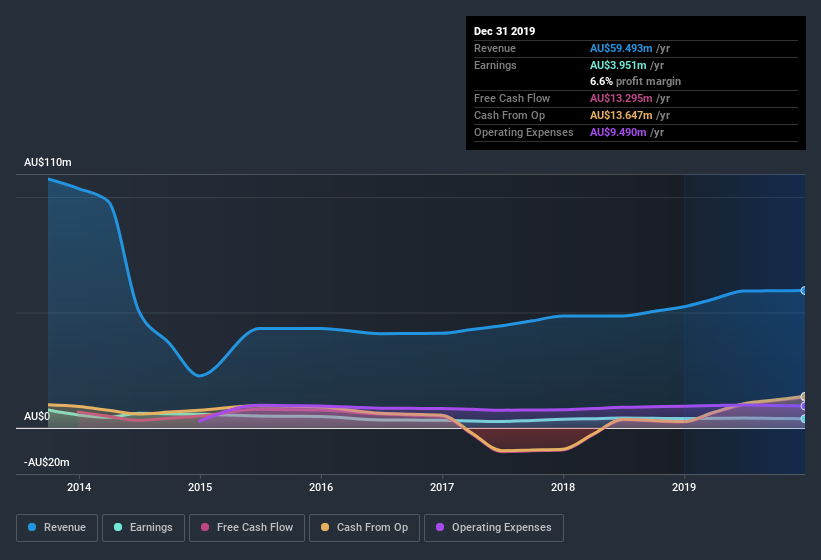- Australia
- /
- Electrical
- /
- ASX:ECL
We Think Excelsior Capital's (ASX:ECL) Statutory Profit Might Understate Its Earnings Potential

As a general rule, we think profitable companies are less risky than companies that lose money. However, sometimes companies receive a one-off boost (or reduction) to their profit, and it's not always clear whether statutory profits are a good guide, going forward. Today we'll focus on whether this year's statutory profits are a good guide to understanding Excelsior Capital (ASX:ECL).
While Excelsior Capital was able to generate revenue of AU$59.5m in the last twelve months, we think its profit result of AU$3.95m was more important. Happily, it has grown both its profit and revenue over the last three years, as you can see in the chart below.
See our latest analysis for Excelsior Capital

Importantly, statutory profits are not always the best tool for understanding a company's true earnings power, so it's well worth examining profits in a little more detail. So today we'll look at what Excelsior Capital's cashflow tells us about the quality of its earnings. Note: we always recommend investors check balance sheet strength. Click here to be taken to our balance sheet analysis of Excelsior Capital.
A Closer Look At Excelsior Capital's Earnings
In high finance, the key ratio used to measure how well a company converts reported profits into free cash flow (FCF) is the accrual ratio (from cashflow). In plain english, this ratio subtracts FCF from net profit, and divides that number by the company's average operating assets over that period. This ratio tells us how much of a company's profit is not backed by free cashflow.
As a result, a negative accrual ratio is a positive for the company, and a positive accrual ratio is a negative. While having an accrual ratio above zero is of little concern, we do think it's worth noting when a company has a relatively high accrual ratio. Notably, there is some academic evidence that suggests that a high accrual ratio is a bad sign for near-term profits, generally speaking.
Over the twelve months to December 2019, Excelsior Capital recorded an accrual ratio of -0.30. Therefore, its statutory earnings were very significantly less than its free cashflow. In fact, it had free cash flow of AU$13m in the last year, which was a lot more than its statutory profit of AU$3.95m. Excelsior Capital shareholders are no doubt pleased that free cash flow improved over the last twelve months.
Our Take On Excelsior Capital's Profit Performance
As we discussed above, Excelsior Capital's accrual ratio indicates strong conversion of profit to free cash flow, which is a positive for the company. Based on this observation, we consider it possible that Excelsior Capital's statutory profit actually understates its earnings potential! And on top of that, its earnings per share have grown at 46% per year over the last three years. At the end of the day, it's essential to consider more than just the factors above, if you want to understand the company properly. Keep in mind, when it comes to analysing a stock it's worth noting the risks involved. Our analysis shows 3 warning signs for Excelsior Capital (1 is a bit unpleasant!) and we strongly recommend you look at them before investing.
Today we've zoomed in on a single data point to better understand the nature of Excelsior Capital's profit. But there are plenty of other ways to inform your opinion of a company. Some people consider a high return on equity to be a good sign of a quality business. So you may wish to see this free collection of companies boasting high return on equity, or this list of stocks that insiders are buying.
If you decide to trade Excelsior Capital, use the lowest-cost* platform that is rated #1 Overall by Barron’s, Interactive Brokers. Trade stocks, options, futures, forex, bonds and funds on 135 markets, all from a single integrated account. Promoted
Valuation is complex, but we're here to simplify it.
Discover if Excelsior Capital might be undervalued or overvalued with our detailed analysis, featuring fair value estimates, potential risks, dividends, insider trades, and its financial condition.
Access Free AnalysisThis article by Simply Wall St is general in nature. It does not constitute a recommendation to buy or sell any stock, and does not take account of your objectives, or your financial situation. We aim to bring you long-term focused analysis driven by fundamental data. Note that our analysis may not factor in the latest price-sensitive company announcements or qualitative material. Simply Wall St has no position in any stocks mentioned.
*Interactive Brokers Rated Lowest Cost Broker by StockBrokers.com Annual Online Review 2020
Have feedback on this article? Concerned about the content? Get in touch with us directly. Alternatively, email editorial-team@simplywallst.com.
About ASX:ECL
Excelsior Capital
Invests in direct and indirect investments and listed and unlisted instruments in Australia.
Flawless balance sheet and fair value.

